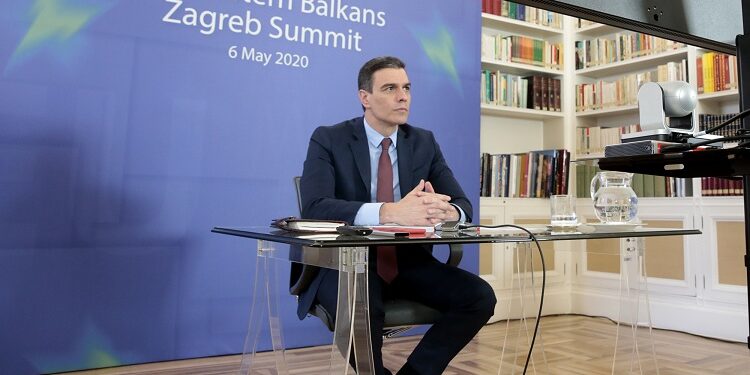The accession of Ukraine, Moldova and the Western Balkans is reshaping the European balance. For Madrid, the challenge lies in safeguarding the CAP and cohesion funds while reinforcing its role as mediator and guarantor of regional stability.
The enlargement of the European Union to the Western Balkans, Ukraine and Moldova has moved from being a distant prospect to a political priority. Spain, traditionally cautious in this debate, now faces a dual challenge: protecting its budgetary interests in the CAP and cohesion policy, while seizing the strategic opportunities offered by new partners in energy, infrastructure and security. The balance between ambition and caution will define Madrid’s role in the Europe to come.
Spain and EU Enlargement to the Western Balkans and Ukraine: Strategic, Budgetary and Diplomatic Implications
Enlargement has returned to the core of the European agenda for geopolitical and security reasons. Since the Granada Declaration of 2023, the EU has reactivated processes and instruments to bring the Western Balkans closer, and—following Russia’s invasion—Ukraine and Moldova as well. For Spain, traditionally supportive of a gradual approach and the Union’s “absorption capacity,” this new cycle opens opportunities—trade, energy security, diplomatic outreach—and clear risks—budgetary pressure, governance with 30+ members, and external border management.
The Enlargement Chessboard Today: Key Players and Timelines
In the East, Ukraine and Moldova formally opened accession negotiations in 2024; they are already in the screening phase of the acquis with the Commission. In the Western Balkans, Montenegro and Albania are advanced in chapters and clusters, while Serbia, North Macedonia and Bosnia and Herzegovina show uneven progress. Kosovo remains a potential candidate, with the additional obstacle of not being recognized by five EU Member States, including Spain.
This momentum is supported by new or reinforced instruments, such as the Growth Plan for the Western Balkans, which accelerates economic integration into the single market and increases pre-accession funding in exchange for verifiable reforms. Spain, with technical expertise in regulatory reforms and market integration (energy, telecommunications, transport), can capitalise on this framework through its public–private sector and international cooperation.
What Is at Stake for Spain
1) EU Budget: CAP, Cohesion and Net Position
Enlargement to economies with GDP per capita below the EU average will place pressure on cohesion and CAP chapters. Spain, currently a moderate net contributor, could see its relative balance reduced and per capita allocations for intermediate regions cut. Madrid has defended predictability and graduality; transferring that doctrine to a Union of 30+ will require alliances with key partners to protect agriculture and territorial cohesion.
2) Governance with 30+: Vetoes and Decision-Making Capacity
A larger EU reopens debate on unanimity in foreign policy, taxation or future accessions. Spain has shown openness to extending qualified majority voting in sanctions or foreign policy, but without fracturing essential consensus. In addition, seat distribution in the European Parliament and voting weights in the Council will need adjustment, preserving the “critical mass” of large and medium-sized states.
3) Security, Migration and Neighbourhood
The Balkans are a corridor for migration routes and energy transit. Their stabilisation reduces pressure on the Western Mediterranean and Spain’s sensitive entry points. At the same time, Ukraine’s accession and Moldova’s alignment strengthen Europe’s perimeter vis-à-vis Russia, something Spain supports within a NATO/EU framework. Spain’s participation in civilian missions and its experience in border management are assets to export.
4) Position on Kosovo
Spain does not recognise Kosovo’s independence, a constraint weighing on certain files. Maintaining a prudent policy—support for the Belgrade–Pristina dialogue, technical cooperation, and operational recognition of documents when necessary, without altering the principle position—will allow Madrid to sustain credibility in the Balkan dossier.
Economic and Business Agenda
-
Energy and Climate: electricity interconnections, renewables and grids.
-
Infrastructure and Transport: TEN-T corridors, modernisation of rail and port systems.
-
Digital and Public Administration: digital identity, e-justice, public procurement.
-
Agri-food: adaptation to CAP standards and food safety.
The Growth Plan offers gradual access to the single market and additional funding if benchmarks are met; it aligns with Spain’s offer of technical assistance and co-investment.
Public Opinion and Narrative
A majority of European citizens support enlargement, but demand clear communication about transitional costs and strategic benefits. In Spain, the narrative should link enlargement to energy security, border stability and business opportunities.
Conclusion
Enlargement is no longer a technical dossier; it is a strategic decision for post-war Europe. For Spain, the challenge is not to choose between ambition and caution, but to shape an enlargement that strengthens the Union’s security, prosperity and governance. With budgetary discipline, proposals for institutional reform, and leadership in early sectoral integration, Madrid can act as a hinge between those demanding speed and those calling for guarantees.
📊 Box: Key Dates and Risks for Spain
Negotiation Timetable
-
Ukraine and Moldova: negotiations opened in 2024, screening ongoing.
-
Montenegro and Albania: advanced in chapters, possible accession around 2028–2030.
-
Serbia, North Macedonia and Bosnia: uneven progress, risk of political deadlock.
-
Kosovo: candidacy conditioned by lack of recognition.
Budgetary Risks for Spain
-
Reduction of cohesion funds for intermediate regions.
-
Increased competition for CAP funds.
-
Higher net contributor balance.
Strategic Opportunities
-
Leadership in energy, digital and infrastructure projects.
-
Export of expertise in governance and rule of law.
-
Strengthened security on the EU’s southern and eastern flanks.
© All rights reserved, Grupo Prensamedia.







